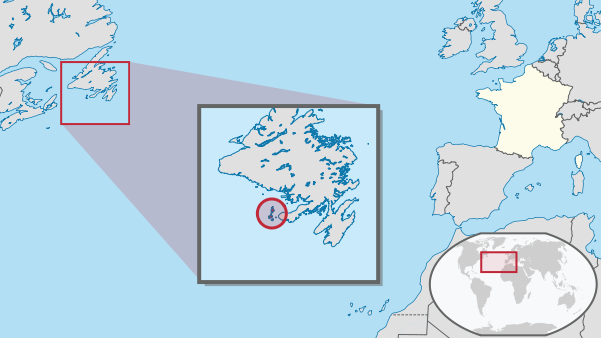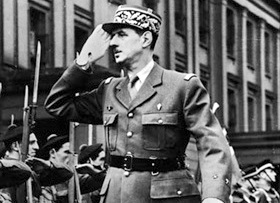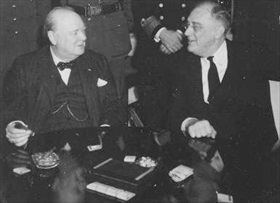FREE FRENCH SEIZE ISLANDS OFF CANADA
Washington, D.C. · December 24, 1941
On this grim date, Christmas Eve 1941, a tiny piece of Vichy France—the Atlantic islets of Saint Pierre and Miquelon, whose granite outcroppings lay just 12 miles off the Newfoundland coast adjacent to Canada—fell to the forces of Free France. It was the first French territory to be liberated in World War II. A force of three corvettes and a submarine under the command of Vice Admiral Emile Henry Muselier, whose tiny flotilla had departed from Halifax, Canada, seized the islets at the direction of Charles de Gaulle’s London-based Free French over the objections of the U.S. State Department, struggling at the moment to preserve fragile relations with Marshal Philippe Pétain’s collaborationist French regime based at Vichy and its sizable fleet at the French naval base at Toulon on the Mediterranean coast. (Under terms of the Franco-German armistice of June 1940, the French fleet remained outside German command and control.)
A Christmas Day plebiscite by the citizens of Saint Pierre and Miquelon, whose supply of food and other provisions from the Canadian provinces had been cut off, voted 98 percent in favor of adhering to Free France and sacking their Vichy administrator. The one‑star Gen. de Gaulle had assumed for himself the mantle of France-in-exile, and his audacious feat of arms off the North American coast over Christmas 1941 was done, in the words of British Prime Minister Winston Churchill (he was in the States at the time), “in bad faith” because it was an unauthorized action launched from a “British dominion” (i.e., the Canadian province of Nova Scotia).
De Gaulle’s bloodless coup de main was also done to preempt a possible joint occupation of the islets by U.S. and Canadian forces (Canada had announced its intention to land troops on the islands to prevent German use of the islands’ radio transmitter), as well as to prevent the islands’ forced “neutralization.” Indeed, earlier in December an envoy of President Franklin D. Roosevelt had met with the Vichy High Commissioner for French possessions in the Western Hemisphere to discuss terms for the neutralization of Saint Pierre and Miquelon, as well as Vichy’s Caribbean colonies. De Gaulle’s coup off the North American coast underscores why the Frenchman’s relationship with Roosevelt was never better than sour.
[amazon_carousel widget_type=”ASINList” width=”600″ height=”200″ title=”Recommended Reading” market_place=”US” shuffle_products=”False” show_border=”False” asin=”1585672491,1904341446,0306820617,1620878054,1566634849,1909869090,1586482823,0471180718,1439183244,0812972821″ /]
Le Grand Charles Infuriated U.S. and British Governments by Seizing Saint Pierre and Miquelon Islands
 |
Above: Vichy France’s Saint Pierre and Miquelon Islands lay 12 miles off the Newfoundland coast of Canada and 2,373 miles from metropolitan France.
 |  |
Left: Appearing first on the world stage in June 1940 as a recently promoted French brigadier general now in London exile, Charles de Gaulle quickly angered his English host, Prime Minister (since May 1940) Winston Churchill, and the President of the United States, Franklin D. Roosevelt. Churchill, who described de Gaulle in mid-1940 as “the man of destiny at the hour of reckoning,” came to view de Gaulle as selfish, vain, an opportunist, unscrupulous, “ambitious to the last decree,” a man he suspected of having “fascist tendencies.” Roosevelt viewed de Gaulle as suffering from delusions of grandeur, labeling him “well-nigh intolerable” and doubting for much of the war period that de Gaulle enjoyed the support of the French people that he claimed. Churchill and Roosevelt are alleged to have plotted to remove de Gaulle as leader of the French Resistance at a critical moment in World War II. In May 1943 de Gaulle decamped from London to set up his Free French base in Algiers in North Africa, now finally freed of Pétain loyalists and the Axis military menace. Churchill and Roosevelt sidelined him in the planning for France’s liberation (Operation Overlord), but de Gaulle outfoxed his two Western opponents when he entered Paris on August 25, 1944, set up a provisional government (gouvernement provisoire de la République Française), and forced the Allied coalition to recognize him as France’s legitimate leader.
![]()
Right: De Gaulle fought a number of wars as the most prominent leader of the Free French movement: a public war against Germany and its Vichy collaborators and a private war against both Churchill and his British ministers and the Roosevelt administration, which promoted French Gen. Henri Giraud as a rival leader to himself. One of de Gaulle’s advisers remarked that “the General must constantly be reminded that our main enemy is Germany. If he would follow his own inclination, it would be England.” Before departing London for Algiers in 1943, de Gaulle said goodbye to Churchill’s foreign secretary, Anthony Eden, who asked him, “Do you know you have given us more difficulty than all our European allies?” De Gaulle responded, “I have no doubt of it.”
Dramatization of an Exchange Between Churchill and de Gaulle in London on the Eve of the Fall of France, June 1940
![]()

 History buffs, there is good news! The Daily Chronicles of World War II is now available as an ebook for $4.99 on Amazon.com. Containing a year’s worth of dated entries from this website, the ebook brings the story of this tumultuous era to life in a compelling, authoritative, and succinct manner. Featuring inventive navigation aids, the ebook enables readers to instantly move forward or backward by month and date to different dated entries. Simple and elegant! Click
History buffs, there is good news! The Daily Chronicles of World War II is now available as an ebook for $4.99 on Amazon.com. Containing a year’s worth of dated entries from this website, the ebook brings the story of this tumultuous era to life in a compelling, authoritative, and succinct manner. Featuring inventive navigation aids, the ebook enables readers to instantly move forward or backward by month and date to different dated entries. Simple and elegant! Click 











